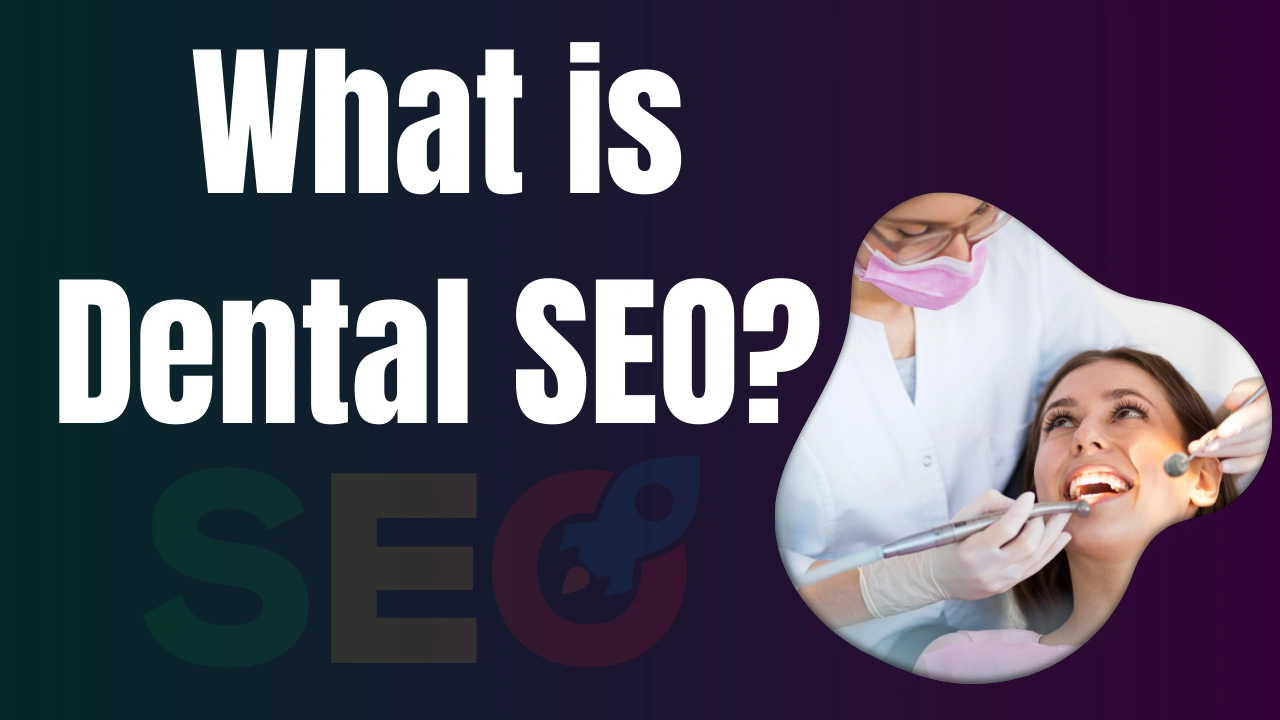What is Dental SEO? A Complete Guide
Dental SEO helps your website show up higher in search engines like Google. When people search for dental services, SEO helps your practice appear first. This means more people will visit your website. More visitors can lead to more patients. In this guide, we’ll explain how Dental SEO works. We’ll also show why it’s important for your practice. Finally, we’ll give you simple steps to improve your online presence. Whether you’re new to SEO or want to improve, this guide will help you.
What is Dental SEO?
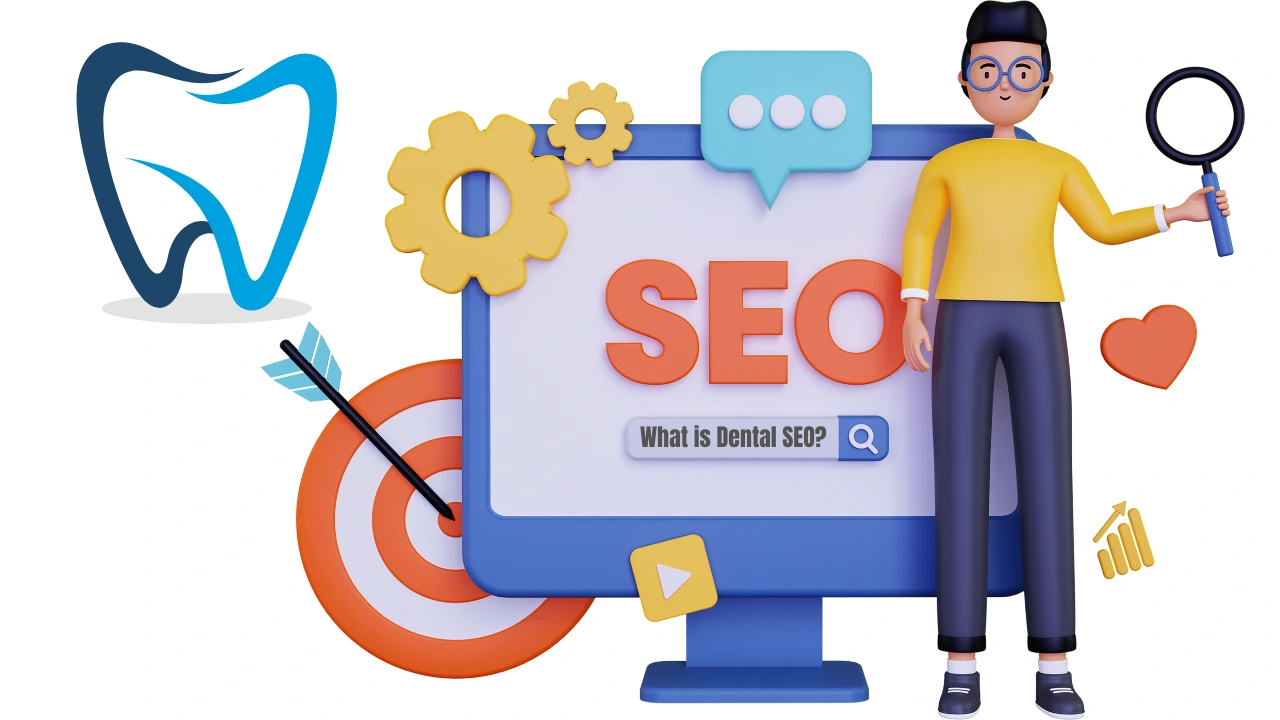
Dental SEO stands for Search Engine Optimization. It’s a way to help your dental practice appear on Google when people search for dental services. SEO includes:
- Using the right keyword.
- Improving your website’s structure.
- Making it easy for search engines to find your page.
Is SEO Important for Dentists?
SEO is important because most people find dentists online. When someone searches for a dentist near them, they will likely click on the top results. If your website ranks well, more people will visit it, leading to more potential patients.
How Can SEO Help Grow a Dental Practice?
Good SEO makes your website easy to find. When patients can find your website quickly, they are more likely to call and book an appointment. Over time, SEO helps your practice grow by bringing in new patients who may have yet to find you.
How SEO Affects Websites and Online Presence
SEO helps websites rank higher. When a website ranks high, more people visit it. This means more people see your business online.
Key Benefits of SEO for Dental Practices
SEO can bring dentists more patients. When your website ranks high, it appears first when people search for dental services. This means more clicks, visits, and appointments.
Why Dental SEO is Different
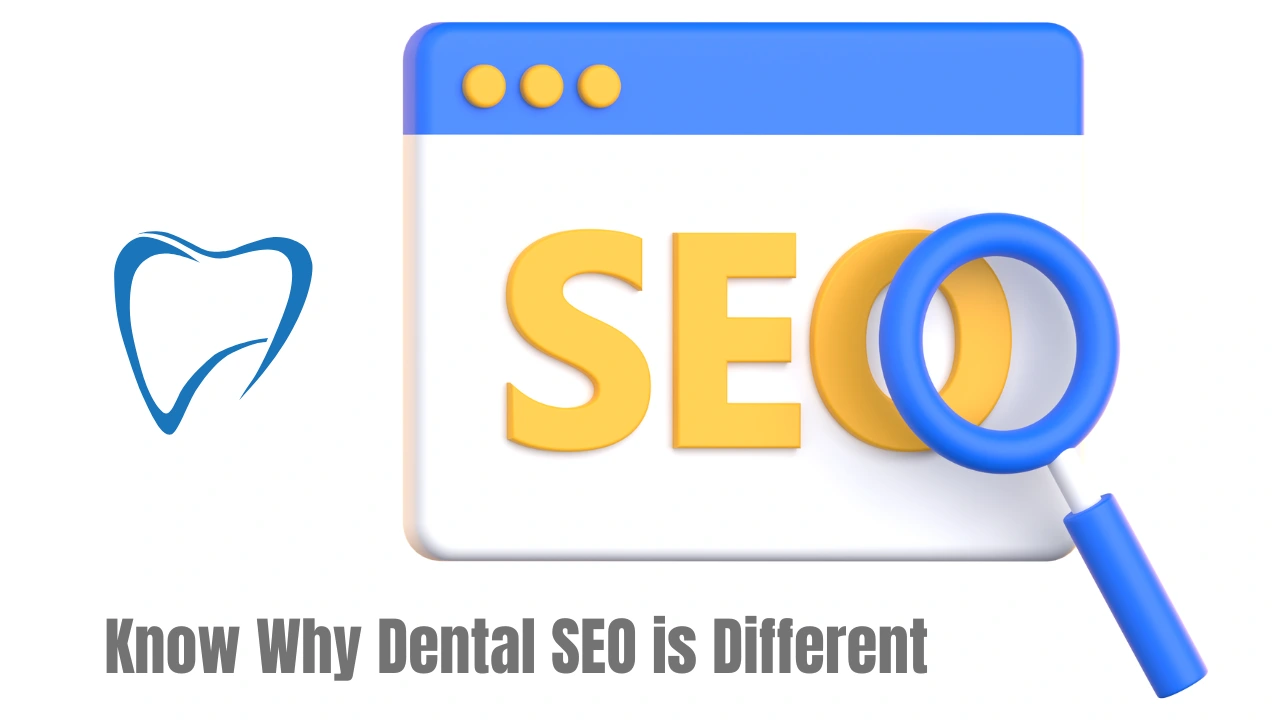
General SEO helps any website rank higher. Dental SEO focuses on dental-related keywords and services. It makes sure your practice shows up when people search for dentists.
Importance of Targeting Local Patients
Most dental patients search for services near them. Local SEO helps your practice appear in local searches. This helps attract patients from your neighbourhood or city.
Specific Needs and Challenges of Dental SEO
Dental SEO has unique challenges. Dentists must target services like teeth whitening or braces. They also need to manage reviews, ratings, and local competition.
How Dental SEO Works
Dental SEO improves your website’s visibility on search engines like Google. It uses strategies like keyword optimization, local SEO, and content creation to attract more patients.
On-Page SEO: What It Is and Why It Matters for Dentists

On-page SEO means using the right keywords on your website. It also includes writing clear content and optimizing titles and images. This helps search engines understand what your page is about. Using keywords like “best dentist near me” is very important for dentists. Do you need on page SEO service?
Here are key on-page SEO elements:
- Title Tag Optimization
- Meta Description
- Header Tags (H1, H2, H3, etc.)
- Keyword Optimization
- Image Alt Text
- Internal Linking
- URL Structure
- Content Quality and Relevance
Off-Page SEO: The Importance of Backlinks and Reputation Management

Off-page SEO focuses on things outside your website. It includes getting backlinks from trusted sources. Good reviews and managing your reputation also matter. The more positive mentions your practice has online, the better your chances of ranking high.
Here are key off-page SEO elements:
- Backlink Building
- Social Media Engagement
- Guest Blogging
- Influencer Outreach
- Local Citations
- Online Reviews
- Brand Mentions
- Forum Participation
Local SEO: How to Target Patients in Your Area
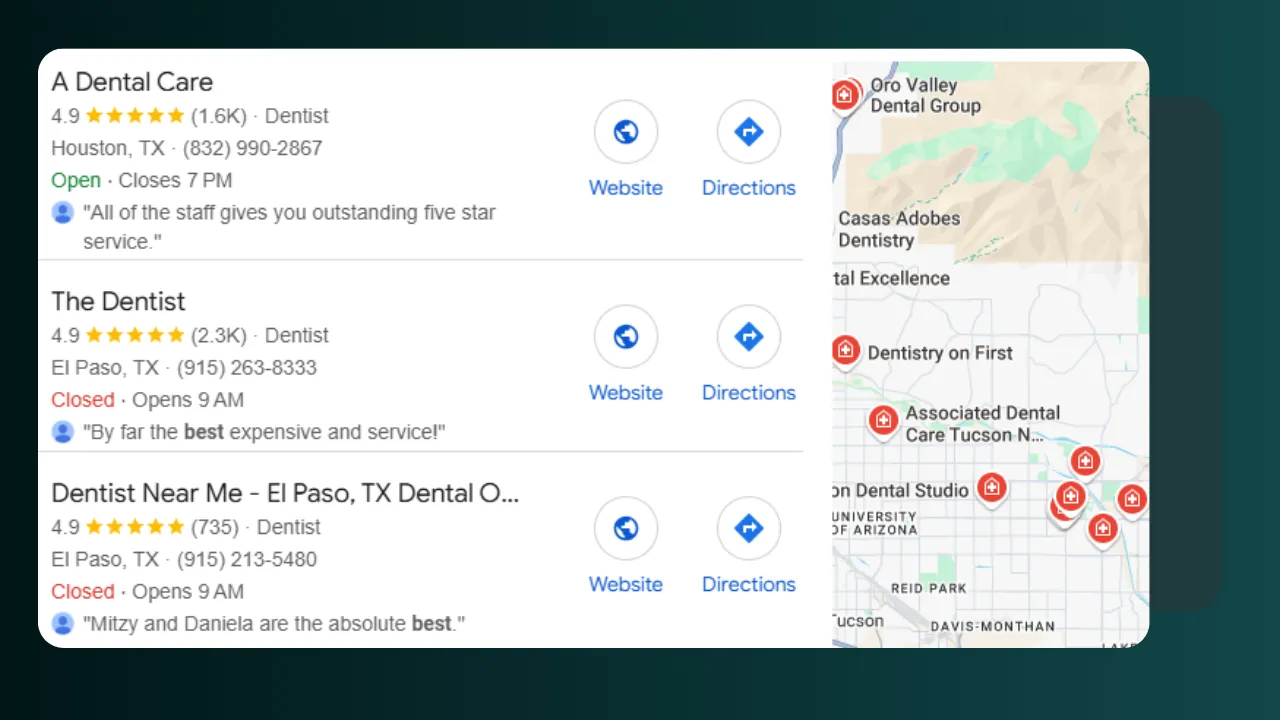
Local SEO helps people near you find your practice. This means setting up a Google My Business page, getting reviews, and using location-based keywords. It ensures your practice shows up when someone nearby searches for dental services.
Here are key Local SEO elements:
- Google My Business Optimization
- Local Keywords Usage
- NAP (Name, Address, Phone) Consistency
- Local Citations and Directories
- Online Reviews and Ratings
- Localized Content Creation
- Mobile-Friendly Website Design
- Location-Specific Backlinks
Key Components of Dental SEO
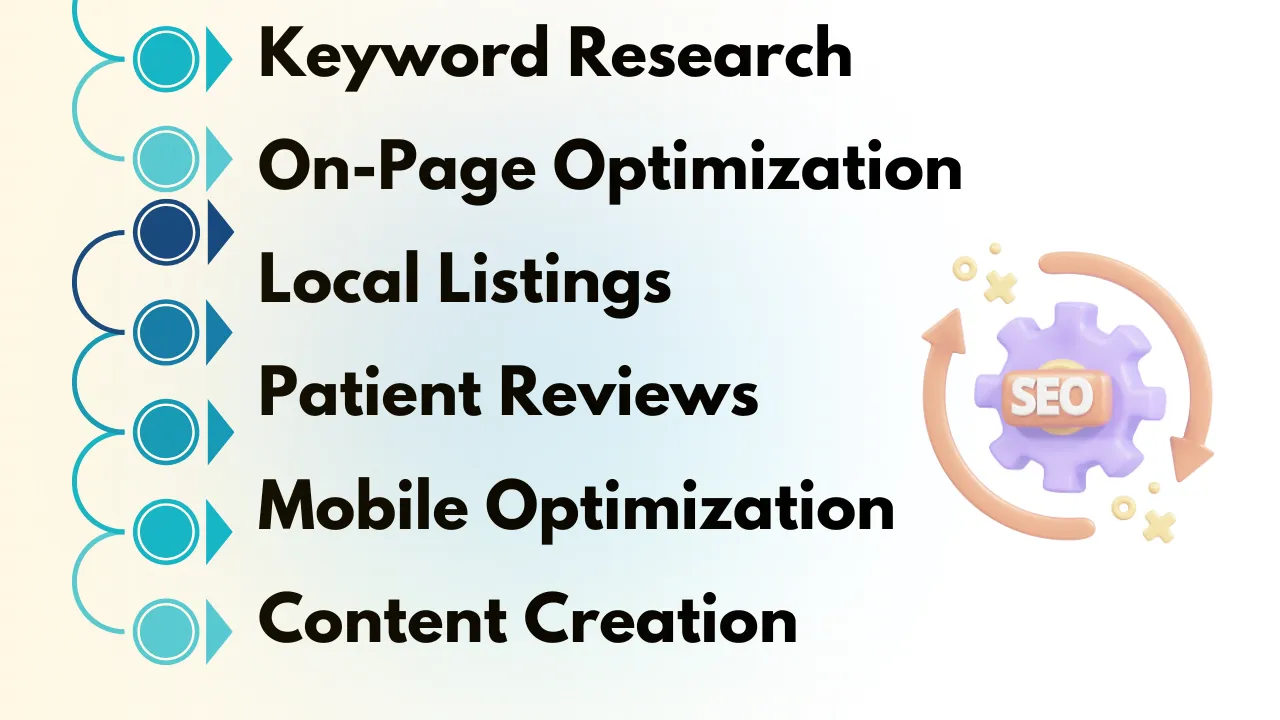
Keyword Research: Identifying the Right Keywords for Dental Services
Keyword research helps you find what patients are searching for. You need to know the right words, like “best dentist for children” or “affordable dental implants.” Using these keywords on your site helps your practice show up in searches. You can use those tools for keyword research: Google Keyword Planner, Ahrefs Keywords Explorer, SEMrush, Ubersuggest, Moz Keyword Explorer, AnswerThePublic, Google Trends, KeywordTool.io
On-Page Optimization: Optimizing Website Content, Meta Tags, and Images
On-page optimization helps make your website easier to find. It includes using keywords in your content, titles, and meta descriptions. You also need to optimize images by adding alt text so search engines can read them. This helps your site rank higher.
Local Listings: Google My Business and Local Directories
Local listings are important for dental SEO. Setting up a Google My Business page helps your practice appear on Google Maps. You should also list your practice in local online directories to increase visibility in your community.
Patient Reviews: Importance of Online Reviews for SEO
Online reviews are a big part of SEO. Positive reviews help build trust with potential patients. Reviews boost your rankings as search engines value their quality and quantity to assess trustworthiness.
Mobile Optimization: Ensuring Your Site Is Mobile-Friendly
Many people search for dentists on their phones. Your website must be mobile-friendly. A mobile-optimized site helps keep users on your page longer, which can improve your ranking in search results.
Content Creation: Blogging and Informative Articles for Your Dental Practice
Creating helpful content is key to dental SEO. Blogging about common dental issues or tips for good oral hygiene attracts more visitors. It also makes your practice seem more trustworthy, which can help improve your rankings.
How to Get Started with Dental SEO
To start with dental SEO, first do keyword research. Then, optimize your website content. Set up Google My Business and start getting reviews. These steps will help your site get noticed and attract more patients.
Choosing the Right SEO Tools and Resources
SEO tools like Google Analytics and SEMrush help track your progress. They show how well your website is doing and where to improve. The right tools will help you make smart choices for your SEO strategy.
Building a Simple, Effective SEO Strategy
Start with the basics:
- Use good keywords, focus on local SEO, and create quality content.
- Build your strategy step by step.
- Track your results and make changes to keep improving your SEO over time.
Common Dental SEO Mistakes to Avoid

Overuse of Keywords (Keyword Stuffing)
Keyword stuffing can hurt your rankings. It’s important to use keywords naturally in your content. Too many keywords make your website more challenging to read and less attractive to users and search engines.
Ignoring Local SEO
Ignoring local SEO means missing out on local patients. Always make sure your Google My Business page is up to date. Include your practice’s name, address, and phone number on every website page.
Not Optimizing for Mobile
Many people search for dentists using their phones. If your site isn’t mobile-friendly, you could lose potential patients. Make sure your website works well on both phones and computers.
Lack of Content Updates and Blog Posts
SEO is constantly changing, and so should your content. Update your website and blog regularly with new information. This will keep your site fresh and help improve your rankings over time.
The Role of Google My Business in Dental SEO
What is Google My Business?
Google My Business (GMB) is a free tool for businesses to manage their online presence. It helps your dental practice appear on Google Search and Maps. With GMB, you can show your location, hours, services, and patient reviews.
How to Set Up and Optimize Your Profile
Setting up GMB is easy. First, create or claim your profile. Add your practice name, address, phone number, website, and business hours. Upload good photos and write a clear description of your services. Keep your information accurate and up-to-date.
The Impact of GMB on Local Search Rankings
Having a complete and optimized GMB profile improves your local rankings. It helps your practice show up when people nearby search for a dentist. The more complete your profile, the better your chances of being found by potential patients.
Tracking and Measuring SEO Success
![]()
Key Metrics to Track (Website Traffic, Search Rankings, etc.)
Track website traffic, keyword rankings, and patient calls to measure your SEO success. Google Analytics shows how many visitors visit your site and what pages they visit. Tracking these metrics helps you find areas that need improvement.
Tools for Tracking SEO Performance (Google Analytics, Search Console, etc.)
Tools like Google Analytics and Google Search Console are important for tracking SEO. Google Analytics shows how visitors find your website. Search Console helps monitor your site’s search performance. These tools help you see what is working and what isn’t.
How to Know If Your SEO Efforts Are Working
If your website traffic is growing and your search rankings are improving, your SEO efforts are working. You should also see more patient calls and appointments. Keep track of these signs to know if your SEO strategy is effective.
Wrapping up
Recap of the Importance of Dental SEO
Dental SEO helps your practice appear online when patients search for dental services. Optimizing your website, using the right keywords, and improving your local presence can attract more patients.
Final Tips for Success in Dental SEO
Start by focusing on local SEO and Google My Business. Regularly update your website with fresh content and positive reviews. Consistency and quality are key to long-term SEO success.
Encouraging Dentists to Start Improving Their Online Presence
It’s always possible to start improving your online presence. Focusing on SEO can grow your practice and reach more patients. Start small, track your progress, and continue improving your website and content.
FAQs
What is dental SEO, and why is it important?
Dental SEO helps your practice rank higher in search engine results. It’s important because it helps local patients find your dental services when they search online.
How long does it take to see results from dental SEO?
SEO results usually take 3-6 months. Consistent efforts like optimizing your website and getting reviews will slowly improve your rankings.
Do I need to hire an SEO expert for my dental practice?
You can try SEO independently, but hiring an expert can speed things up. They can make a strategy just for your practice, helping you rank higher faster.
How can Google My Business help my dental practice?
Google My Business helps your practice appear in local search results and Google Maps. It’s a key tool for attracting local patients and improving your online presence.
What are the most important SEO factors for dentists?
The most important SEO factors are using the right keywords, optimizing your website for mobile, managing patient reviews, and setting up a Google My Business profile.
Can SEO help attract new dental patients?
Yes, SEO can help bring more patients to your practice. By ranking at the top of local search results, you increase the chances people will find your services and book an appointment.
How can I track the success of my dental SEO efforts?
You can track SEO success with tools like Google Analytics and Google Search Console. These tools help you monitor website traffic, search rankings, and other key metrics.








